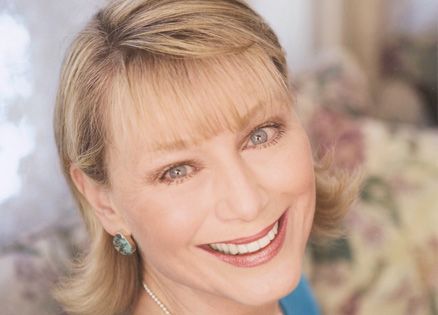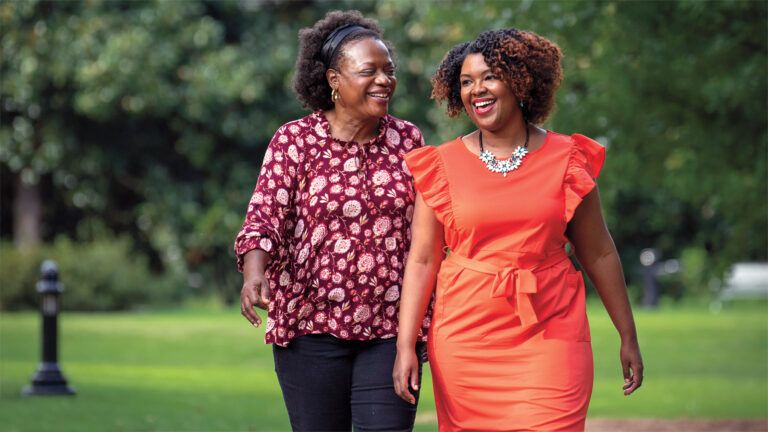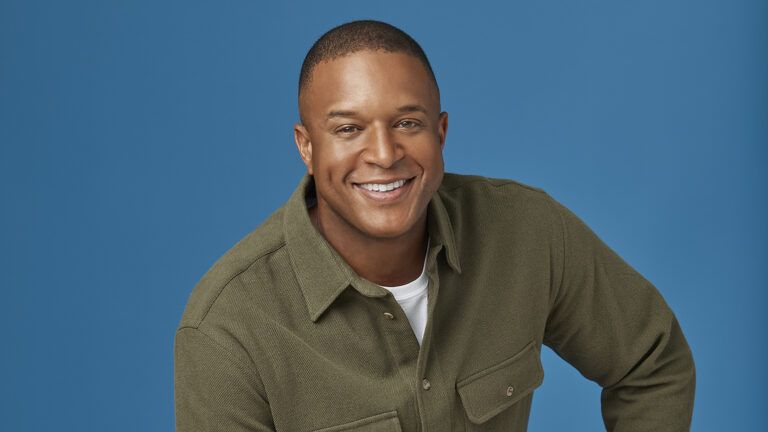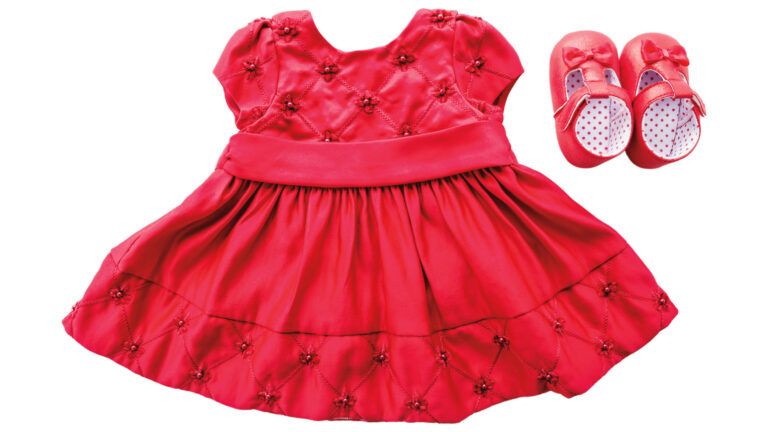Mom's eyesight was deteriorating, but I didn't know just how bad it had gotten until I saw her stooped in the one-bedroom in-law apartment attached to our house, reaching to pick up something off the floor.
She grabbed at it, then studied her empty thumb and forefinger with a puzzled expression. Again she tried to pinch the glimmering spot on her living-room rug. Nothing.
Frowning, she turned to me. Behind the thick lens of her glasses her blue-green eyes clouded with concern. "Mom," I said, "it's just a patch of sunlight."
She shook her head, wary to admit something was wrong. That much I could be grateful for. Her attitude was always positive, even determined. She took the challenges of getting old in stride. "I guess we need to talk," she said.
Back when she first moved in with us, I didn't know what it would be like. She was in her late 70s, fiercely independent, and I was a mom raising two kids in the suburbs.
We hadn't lived under the same roof since I left for college. We were unalike in so many ways. She was disorganized and spontaneous, I was a bit of a control freak.
My idea of fun as a girl was alphabetizing the books in my bedroom while she loved to spend a whole afternoon shopping, especially if there was a sale. I thought it was an incredible waste of an afternoon.
In junior high I insisted that my shirt and skirt had to match exactly. "Don't be afraid to mix things up," Mom would say. "Everything doesn't have to match." Oh, yes it did.
But all that was long ago. What would it be like having her right here with us? She liked to entertain friends at the drop of a hat. She loved it when people dropped in unexpectedly for tea and a chat. I liked having company too, but I preferred advance notice. Twenty-four hours. Minimum.
At least her apartment adjoining our house had its own kitchen, its own bathroom and its own entries. It makes sense to have her move in, I told myself. Now that she was older, I wouldn't worry so much about her if she were next door. We could get right to her if there were some emergency. Still, I wondered. After so many years apart, we were such different people. And she was so independent.
The kids were thrilled to have "Mama B" so close, the fridge covered with their artwork and filled with treats. We made sure Mom had her own mailbox and phone, and soon she had her own friends.
I could hear their laughter through the wall and the sound of the whistling teakettle. I could peek through the window and see the table she had set for her bridge group, mixing the different patterns of china and glassware. So like Mom. For a moment I wished I could be so creative.
We found ways to help her deal with her macular degeneration. My husband, Tom, installed bright halogen lights in her living room. My sister, Laurrie, sent away for a special telephone with big-print numbers.
We used colorful plastic adhesive buttons to identify the proper settings on her thermostat and microwave. She was able to be independent and so was I. She could still spend the whole afternoon shopping at a department store sale if she wanted.
Then came that morning I saw her picking a spot of sunlight off the floor. "Maybe I need more help than I thought," Mom said. I took a deep breath.
"Yes," I said, "I guess so." I should have been prepared for this, but I wasn't. I thought things could stay as they were. Mom was going blind, and the doctors said nothing more could be done. I retreated to my kitchen and said a prayer for strength.
Then I set out to find a whole new set of resources. I discovered that our town provided a free service called the "GetAbout" van for seniors who needed transportation. My sister pitched in with frequent visits and trips with Mom to the city. And all those friends whose laughter I heard through the wall…they were only too glad to help.
Life took on a sense of new normal. Soon I could hear the teakettle sing on the other side of the wall.
Once, after an afternoon with her friends, Mom came to me, giggling. "The girls had me sit on the floor. They wanted to watch me get up on my own. They couldn't believe I was so limber." I could hear the note of pride in her voice. Would I have gotten down on the floor in front of my friends just to prove a point?
"You know," Mom continued, "losing your sight isn't so bad. When you can't see the wrinkles, everyone looks beautiful!"
I looked at her and wondered if I could ever be so accepting of such a scary thing as losing my eyesight. What I once saw as Mom's disorganization now seemed to be an incredible flexibility, a gift for rolling with life's punches, of adapting.
A few weeks before Christmas in 2002, Mom complained of shortness of breath. Her legs hurt and her usually thin ankles were swollen and stiff. Her blood pressure was high too. The internist sent us to the cardiologist who sent Mom to get an echocardiogram.
In the examination room I guided Mom's thin arms through the gaping holes of a huge blue paper gown. How tiny and frail she looked. When had she gotten so old? I wondered. Mom had congestive heart failure. She wasn't a good candidate for heart valve replacement surgery. "But with proper medication," the cardiologist said, "she should be able to live another two or three years."
Two or three years, I thought in dismay. That's so little time!
One afternoon while sorting a month's supply of Mom's meds into four oversized plastic boxes labeled for the days of the week, my elbow accidentally bumped the top box and sent dozens of pills spilling onto the kitchen floor. Getting down on my hands and knees to retrieve them, I felt overwhelmed with sadness. God, I prayed, why does it have to end like this?
Then, in my heart, I heard a voice stern but tender: I'm giving you this time with her. I listened to the voice with wonder. I repeated the words to myself: I'm giving you this time with her.
The whistling teakettle, the noise of the television, the thump of Mom's kitchen cabinet doors came later and later in the day. The friends still visited but not in big groups anymore and the laughter was quieter. There were no more shopping sprees.
Each morning I peeked through the blinds of Mom's back door and watched her tiny shoulders and chest rise and fall as she slept. How I dreaded the morning that I would find that she wasn't moving.
Daily I braced myself for that moment, knowing it had to come. I told myself it would be a blessing if Mom could simply die peacefully in her sleep. Yet I dreaded it. But what was it I dreaded? Her death? Or that sense of being dissimilar that I was still trying to shake?
She made one last trip to the hospital. A wirelike temporary pacemaker had to be inserted through her shoulder to keep her alive. But her organs were failing.
On a Monday night in August our family gathered around Mom in her hospital bed. Laurrie held one hand. I held the other. Tom stood at the foot of the bed. It wouldn't be long. Her grandchildren hugged her goodbye. Mom nodded. She was still with us. Barely. I looked down. Mom's lips moved ever so slightly. I bent my head closer. "Help me," she whispered.
"We're here, Mom," I squeezed her hand tightly. Her breathing was so slow. I was certain each breath would be her last.
"Help me," she said again. Help you? I looked to my sister and Tom. How could we help her? There seemed nothing more we could do. We'd done everything the doctors said we could.
Then, suddenly, I understood. Mom wasn't asking for help to live but to die. In the strangest way, I felt like a midwife at the bedside of a woman about to give birth, except Mom was laboring to move on to the next life. "Help me."
Tears ran down my cheeks. "We're here, Mom. I love you. It's all right." Her breathing grew shallow. Breaths came farther apart. I thought of my message from God. This time with her. I had feared her moving in would be difficult. Instead it had been an amazing gift.
Even now, as her soul was leaving us, I felt something incredible. In the space between those final breaths that distance I'd always imagined between my mother and me evaporated until I felt as close to her as I'd ever felt to any human being.
Finally there was no breath. Mom was gone. Tom reached for our hands and we said a prayer. We spent the rest of that night talking and reminiscing about Mom.
Later as I was falling asleep I thought about how different I'd felt from her when I was young. But now something unexpected and spontaneous crept into my mind. Tomorrow I would go to one of the sales that Mom so loved and shop for just the right dress to wear to her funeral—all afternoon, if necessary.






